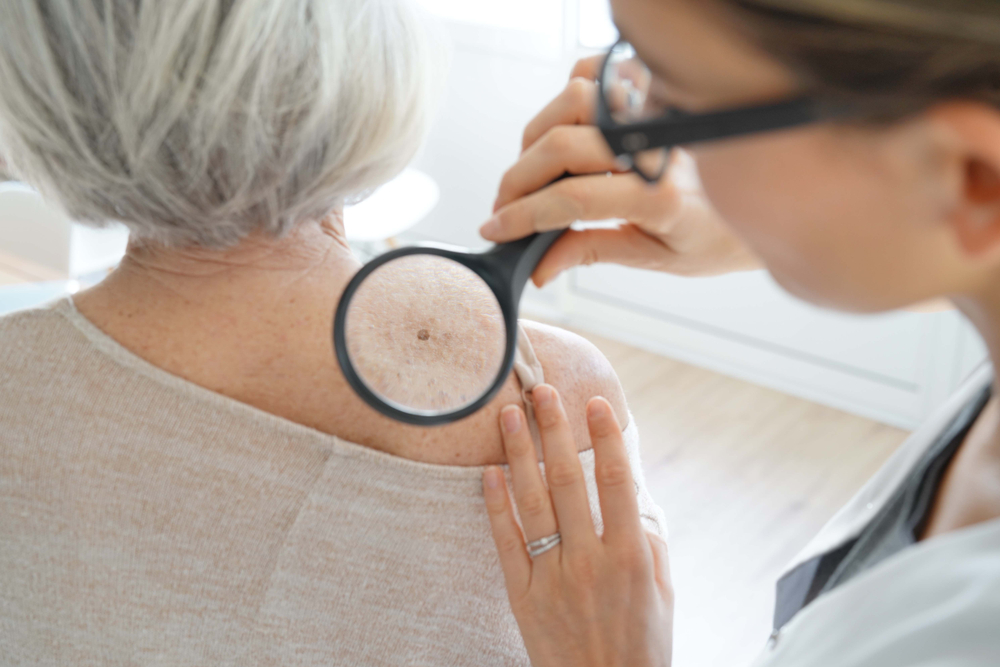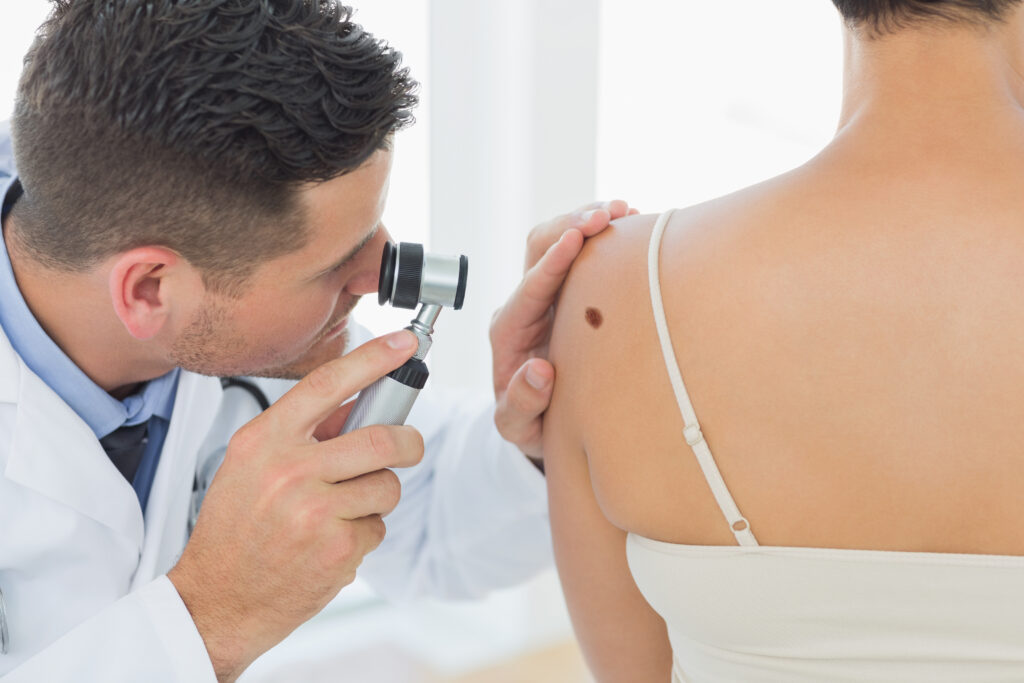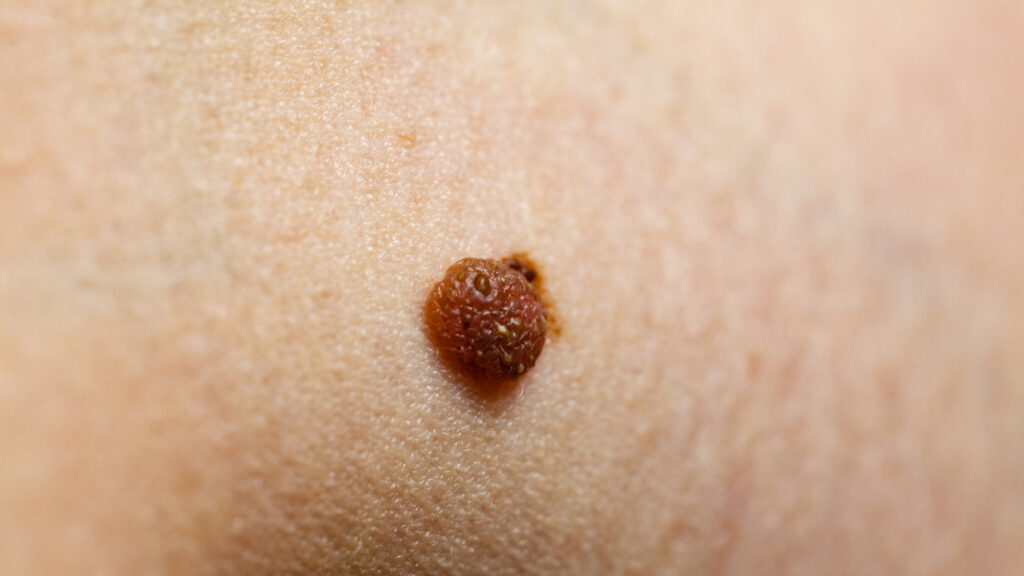Skin cancer is the most common form of cancer in the United States. It develops when abnormal cells grow out of control in the outer layer of skin, known as the epidermis. While there are several types of skin cancer, the good news is that most are highly treatable, especially when detected early. The dermatologists at Calkin & Boudreaux are experts in diagnosing all types of skin cancer and providing you with the necessary treatment.
What Is Skin Cancer?
There are three main types of skin cancer:

Basal Cell Carcinoma (BCC)
Basal cell carcinoma is the most common type of skin cancer. It typically appears as a pearly or waxy bump on the skin, often on sun-exposed areas.
It grows slowly and rarely spreads to other parts of the body.
Basal Cell Carcinoma (BCC)
Basal cell carcinoma is the most common type of skin cancer. It typically appears as a pearly or waxy bump on the skin, often on sun-exposed areas.
It grows slowly and rarely spreads to other parts of the body.
Squamous Cell Carcinoma (SCC)
Squamous cell carcinoma often appears as a red, scaly patch on the skin. It can also develop as a wart-like growth.
Squamous cell carcinoma is more aggressive than basal cell carcinoma and can spread to other parts of the body if left untreated.
Melanoma
Melanoma is the least common but most serious type of skin cancer. It can appear anywhere on the body and can take on many different shapes and colors.
It’s crucial to be aware of the signs of melanoma for early detection. Learn more about the warning signs of melanoma in our article, “3 Warning Signs of Melanoma Dermatologists Wish You Knew and Didn’t Ignore“.
Diagnosing Skin Cancer
If you notice any unusual changes in your skin, it’s essential to see a dermatologist at Calkin & Boudreaux. During a skin exam, a dermatologist will examine your skin for any suspicious spots.
They may also use a tool called a dermatoscope, which provides a magnified view of the skin to help identify abnormalities. If a suspicious spot is found, a biopsy may be necessary.
A biopsy involves removing a small skin sample and examining it under a microscope to determine if cancer cells are present.
Treating Skin Cancer
The treatment for skin cancer depends on the type, size, and location of the cancer. Standard treatment options include:
Surgery
Surgery is the most common treatment for skin cancer. Your dermatologist will remove the cancerous tissue along with a margin of healthy skin to ensure all cancer cells are removed.
Mohs Surgery
Mohs surgery is a specialized procedure used for certain types of skin cancer, particularly basal cell carcinoma. Mohs surgery removes the cancer cells one layer at a time, allowing your provider to examine the tissue under a microscope immediately to ensure complete removal. It’s a preferred treatment when the cancer is on the face, ears, or anywhere that there is not much extra skin or minimizing scarring is most important. Learn more about Mohs Surgery in this article “What Does Skin Cancer Look Like?”.
Cryotherapy
Cryotherapy treatment uses liquid nitrogen to freeze and destroy cancer cells.
Radiation Therapy
Radiation therapy uses high-energy x-rays to kill cancer cells.
Topical Medications
Your dermatologist may prescribe topical medications like creams or lotions to treat certain precancerous lesions.

Recovering after Skin Cancer
Following skin cancer treatment at Calkin & Boudreaux, your dermatologist will provide specific instructions on caring for the treated area and monitor for any signs of recurrence. While the recovery process varies depending on the type and extent of treatment, most people experience minimal side effects.
However, emotional recovery is also essential. Don’t hesitate to discuss any anxieties or concerns you may have with your dermatologist or a therapist.
When Should You Get Your Moles Checked by Your Dermatologist?
Here are 11 signs that it could be time to have your moles checked out by your dermatologist:
1. You Notice New Moles Appearing
You should see your dermatologist at Calkin & Boudreaux if you’re an adult and discover a new mole. Approximately 70 percent of melanomas start as a new mole.
It’s best to have your dermatologist check out any new mole to ensure it’s not cancerous. Melanoma is the most dangerous form of skin cancer, as it grows fast and can spread to any organ.
2. You Have an Ugly Duckling Mole
An ugly duckling mole isn’t necessarily unattractive and doesn’t have a particular color, shape, or size. It refers to a mole that looks different or stands out from the rest.
An ugly duckling mole could be darker, lighter, more significant in size, smaller, or different in shape than the others. Ugly duckling moles are not always cancerous.
However, if you find one, it’s worth seeing your dermatologist to ensure it is not cancerous.
3. You Have Asymmetrical Moles
Healthy moles are usually oval or round with two matching sides. If you divide these moles down the middle, both sides would mirror each other.
A mole with two different halves is considered asymmetrical.
Cancerous moles tend to be asymmetrical, so if you spot atypical ones, visit your dermatologist for a skin examination.

4. There Are Irregular Borders on Your Moles
Most benign moles have smooth, even, and distinct borders. You can quickly tell where these moles end, and the rest of the skin starts.
Cancerous moles are more likely to have poorly defined or bumpy borders. Uneven borders are not always a tell-tale sign of cancer, but they do increase the risk.
If a mole has jagged edges, it’s time to visit your dermatologist to get it assessed.
5. You Notice Color Changes on Your Mole
Has your mole changed color? Often, moles retain the same color.
If your mole was one color and has changed, it’s time to schedule a skin cancer screening with your dermatologist.
6. You Have Over 50 Moles
Pay attention to the number of moles on your body. Most people have 10 to 40 moles.
But if you have 50 or more moles, this increases the risk of skin cancer. If you find 50 moles or more on your body, have your dermatologist evaluate them to rule out skin cancer.
7. You Have a Mole with a Large Diameter
Is the size of your mole larger than a quarter inch in diameter or a pencil eraser? Most non-cancerous moles are less than a quarter inch, but exceptions exist.
If you’ve found a mole bigger than a pencil eraser or noticed an increase in mole size, it’s crucial to contact your dermatologist for further assessment.

8. You Notice Your Moles Evolving
Healthy moles usually stay the same shape and size throughout your lifetime. If an existing mole changes in size or shape, that could be a red flag.
For children, however, some changes in a mole may be normal as moles tend to grow proportionally with the child.
Even though some moles change, they do so gradually over several years. Be on the lookout for changes that occur after only a few months.
It’s vital to have any mole checked by your dermatologist if it’s evolving.
9. You Have Moles That Are Multiple Colors
Most non-cancerous moles are one shade. Typically, common moles have even colors of tan, brown, pink, or black.
People with dark hair or skin usually have darker moles than those with blonde hair or fair skin. Although one mole may differ in shade from another, a single mole should have a consistent color throughout.
If you find a mole with various shades instead of one color, get it evaluated immediately by your dermatologist at Calkin & Boudreaux.
10. Your Moles Cause You Pain, Itch, or Bleed
If a mole itches, hurts, oozes, crusts over, or bleeds, it may be a tell-tale sign of a more serious issue. It could be due to irritation from clothes or jewelry rubbing on the mole, skincare products, or detergent.
But these might also be signs of skin cancer, making it essential to have your dermatologist look at it.
11. Your Moles Are Slow to Heal
A healthy mole can get bumped or scraped and should heal quickly. But if it doesn’t heal within three weeks, keeps scabbing, heals, and reopens, or the weeping or bleeding occurs occasionally, it may be a sign of skin cancer.
If a mole exhibits any of these symptoms, have it examined by your dermatologist.
Dr. Lucero emphasizes:
“Many patients are unaware that changes in sensation around a mole can also be a warning sign. If you experience persistent itching, tingling, or even numbness in the area of a mole, it’s worth getting checked out. These sensory changes can sometimes precede visible alterations in the mole’s appearance and might indicate early cellular changes.”
Early detection is critical to successful skin cancer treatment. If you notice any changes in your skin, schedule an appointment with a dermatologist at Calkin & Boudreaux in Sacramento, CA, to get it checked promptly. Our team at Calkin & Boudreaux is committed to providing you with the support and services you need throughout your skin health journey.
